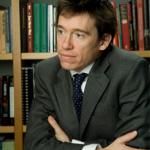Has Britain given up on foreign affairs? Many say ‘We don’t have an Empire anymore’; or that ‘We are not a rich country.’ That has been said since Indian independence in 1947, or perhaps since our economic fragility was laid bare at the end of the First World War. Some ask ‘What right have we got to tell others how to live their lives?’ That question has been gathered momentum since the 1960s. Some ask ‘What business is it of mine?’ That attitude has been going on since the Old Testament.
Meanwhile, the balance of power is shifting to the people, quickly. Parliament blocked government action on Syria. In 2017 there will probably be a referendum over our membership of the European Union. There is disquiet over our aid programmes. Some diplomats find all this worrying. They fear it is a sign that populism or domestic priorities are undermining Britain’s place in the world. They worry that people don’t know about the complexities of foreign affairs and don’t care. They are wrong.
The public is more experienced, more travelled, more informed than at any time in our history. Our education system, and every aspect of our media, encourages us to be critical of our politicians and policymakers, and spot every sign of incoherence, incompetence, or lazy thinking. We have become more aware of our limitations as a country: everyone knows that the Chinese economy is larger than ours, the American economy far larger, and that Germany has been out-performing us in manufacturing. The vast majority of people have now travelled outside Britain. Seventeen per cent of people in London were born outside the United Kingdom. We are immersed in films, music, objects, advertisements and food from other cultures. We have learned to recognise more clearly than previous generations our own prejudices about foreigners. Everyone understands instinctively how difficult it is now to understand or govern Britain, how different Britain is from other countries, and how difficult it is for Britain to influence the world.
So when there is public opposition to foreign policy, it is rooted in real concerns about real issues. European rules are rigid, there are terrible challenges in the Euro-zone; there are ten thousand examples of aid programmes which are poorly conceived, wasteful, or poorly implemented; the role of Bashar Al Assad, Al Qaeda, Iran and Qatar in Syria is bewildering; intervention is unpredictable. Champions of these projects imply that their opponents are simply ‘little Englanders’. They should consider instead that their opponents may sometimes have a point. British culture is changing through immigration, new experiences and new values. Government is being forced to become more ‘transparent’ to the public; our foreign policy institutions must change too. Take the recent revelations from Edward Snowden about surveillance. People are already concerned by the potential role of security and intelligence agencies in their lives. They will want to know they can trust parliamentary oversight. That means reform. We need, as a start, to make the Security and Intelligence Committee of Parliament meet the standards of other committees. It is currently appointed; it should instead be elected by the House of Commons. Its chairman is currently a government back-bencher; in the future, the opposition should chair the committee. If a government wants to convince the British people to support an intervention, they must begin by acknowledging our failures in Iraq and Afghanistan, and explain what reforms have been introduced in the Foreign Office and Army to prevent a repeat.
We need new institutions to represent the public in foreign policy. In the United States, despite all the mistakes, there is much less cosy consensus. Issues are vigorously debated, and clarified, in daily encounters between the Senate, newspapers, think-tanks, Universities, the military, the State Department, non-profits and the National Security Council. People move between these different worlds much more easily. One of my friends at Harvard, Samantha Power, for example, went from being a journalist, to running a Human Rights centre, to working on Obama’s campaign. She is now the American Ambassador to the United Nations, and it’s likely at some point that she will return to being a Professor. This is not unusual; Americans like Samantha carry ideas and debate into government, back to the public, and into government again.
The British Foreign Office needs to begin to open up, to argue and fight its corner, learn from outside experts, challenge its own officials and ministers, and reflect on its own mistakes, and it needs to do so in a way that includes the public. This will involve cultural change within the Foreign Office, and more opportunities for people to move in and out at a senior level. We need investment to make our think-tanks and universities more relevant to contemporary foreign policy. We must learn how to give more weight in foreign policy discussions to well-informed outsiders: soldiers, professors, members of the House of Lords, experienced foreign correspondents and aid workers.
This could be the beginning of the most exciting period in British foreign policy. A more diverse, critical, and experienced population can help us produce better ideas. The right kinds of institutions and public debate can help us develop policies that are coherent, rational, honourable and constructive. Ultimately, the public might regain some trust in government; and other countries might regain some of their trust in us. The new public is not rejecting foreign policy; it simply wants a credible foreign policy, and a chance to influence it. We must make this possible.











